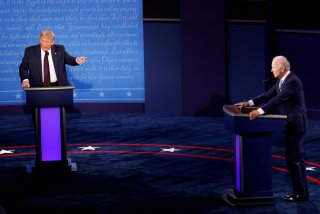The U.S. Presidential Debates Have Become a Reality Show
The Trump-Biden “presidential” debate, if one can call it that, cost American taxpayers something much more valuable than money: their time. Running an hour and a half long, the average citizen would be better off spending that time learning about whales.
By now, there is no need to describe in detail what happened during the first round of the presidential debate between Donald Trump and Joe Biden. Major news outlets and thinkers alike acknowledge that what was supposed to be a civil and professional debate between contestants for one of the most powerful offices in the world was instead sullied by infantile behavior from both sides. Incumbent and challenger both raised their voices to shout across the room to score useless last words. The moderator, Chris Wallace, admirably tried his best but was also forced to resort to shouting to make his point clear. Surprisingly, nobody was pounding their fists on the table or throwing papers. After more than an agonizing hour, Trump and Biden left viewers with little to no serious debate. By throwing around vague statistics and percentages which independent fact-checkers have since found to be almost all misleading, they also left people with more questions than they had at the beginning.
One of the main reasons for the chaos was due to the moderator’s lack of actual power. It became quickly evident that Chris Wallace could not forcefully stop any breaches of protocol, such as contestants going overtime or filibustering with personal attacks. Worse, there are no great solutions to the lack of moderator power either. Giving the moderator the ability to cut the microphone of a contestant who has gone over time means both sides would cry unfair or biased treatment. What about cutting off contestants automatically using a computer program? Supporters on both sides would see the digital setup as both dull, and perhaps unjust. Unsatisfied followers on both sides could ask who built the system and complain of some hypothetical algorithmic bias.
The Trump-Biden “presidential” debate, if one can call it that, cost American taxpayers something much more valuable than money: their time. Running an hour and a half long, the average citizen would be better off spending that time learning about whales. Yes, whales. In half the time, they would know that whales are a significant contributor to neutralizing carbon dioxide in our atmosphere and help fight climate change. The knowledge of this fact alone is worth more than what was delivered by the contestants on stage. It is unsettling but not a surprise that large creatures peacefully roaming the seas have done more for the climate than Biden or Trump ever have or will.
For those still supporting the continuation of presidential debates, try naming at least one memorable event or dialogue from any American presidential debate in history. Don’t know any? How about the discussion in 1858 between Abraham Lincoln and Stephen Douglas? Oh, nobody is alive to remember that. What about John F. Kennedy’s 1960 debate against Richard Nixon? Hold on, they debated? Perhaps Donald Trump versus Hillary Clinton a few years ago? Wait, what did they say again? As almost anyone in the world, it is unlikely one can answer this without an online search.
The presidential debates today may seem like a valuable opportunity for candidates to engage in a battle of natural, off-the-cuff oratory prowess, but this is far from the truth. One does not need to have worked in public relations or to be a political aide on Capitol Hill to know that candidates are rigorously prepared for these debates beforehand. Each candidate is provided for by a small army of some of the nation’s—if not the world’s—best consultants, assistants, and political analysts. Considering every potential scenario of attack, they provide at least a general foundation in possible counterattacks and strategies for their contestant. This type of pre-interview preparation can be found in almost every industry. Regrettably, there is nothing natural or unique about the American presidential debates aside from their waste of time and resources. For a much more dignified alternative, look to the Oxford Union. A debating society associated with the University of Oxford, delegates there who are often half Biden and Trump’s age regularly put them, and other politicians, to shame.
The first round of the Trump-Biden debate was an increasingly familiar scene of national embarrassment televised to the entire world with one clear message: Lady Liberty weeps, and the American system is in a well-televised decline. For too long, the contest for the highest office in the land has been a reality show. Outclassed by any college seminar, Trump and Biden’s performance should convince all but the most hard-headed ceremonial traditionalists that with little value to both the most casual and serious of viewers, America needs to abolish the presidential debates forever.
Symington W. Smith is an award-winning global affairs expert with over a decade of experience in East Asia. A life fellow of the Royal Asiatic Society, a fellow of the Royal Society of Arts, and a Board Member and Political Adviser at Eastern Commerce Group, he has previously worked at the Cabinet Office of the United Kingdom and American multinational law firm Baker McKenzie. Holding degrees from both Peking University and King's College London, his work has been published in The 1828 Journal, Modern Diplomacy and the National Interest.

